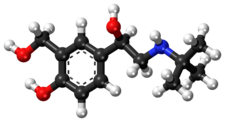Xopenex
 |
|
 |
|
| Clinical data | |
|---|---|
| Trade names | Xopenex |
| AHFS/Drugs.com | International Drug Names |
| Pregnancy category |
|
| Routes of administration |
By mouth (tablets), inhalational (MDI) |
| ATC code | |
| Legal status | |
| Legal status |
|
| Pharmacokinetic data | |
| Metabolism | Hepatic |
| Biological half-life | 3.3–4 hours |
| Excretion | Urinary |
| Identifiers | |
|
|
| CAS Number | |
| PubChem CID | |
| DrugBank | |
| ChemSpider | |
| UNII | |
| KEGG | |
| ChEBI | |
| ChEMBL | |
| ECHA InfoCard | 100.113.688 |
| Chemical and physical data | |
| Formula | C13H21NO3 |
| Molar mass | 239.311 g/mol |
| 3D model (Jmol) | |
|
|
|
|
|
|
|
Levosalbutamol, also known as levalbuterol, is a short-acting β2 adrenergic receptor agonist used in the treatment of asthma and chronic obstructive pulmonary disease (COPD). Evidence does not show that levosalbutamol works better than salbutamol, thus there may not be sufficient justification for prescribing it.
The drug is the (R)-(−)-enantiomer of its prototype drug salbutamol. It is available in some countries in generic formulations from pharmaceutical companies including Cipla, Teva, and Dey, among others.
Levosalbutamol's bronchodilator properties give it indications in treatment of COPD (chronic obstructive pulmonary disease, also known as chronic obstructive lung disease) and asthma. Like other bronchodilators, it acts by relaxing smooth muscle in the bronchial tubes, and thus shortening or reversing an acute "attack" of shortness of breath or difficulty breathing. Unlike some slower-acting bronchodilators, it is not indicated as a preventative of chronic bronchial constriction.
A 2013 systematic review of the drug's use as a treatment for acute asthma found that it "was not superior to albuterol regarding efficacy and safety in subjects with acute asthma." The review concluded: "We suggest that levalbuterol should not be used over albuterol for acute asthma." Levalbuterol is notably more costly.
Generally, levosalbutamol is well tolerated. Common mild side-effects include an elevated heart rate, muscle cramps, and gastric upset (including heartburn and diarrhea).
Symptoms of overdose in particular include: collapse into a seizure; chest pain (possible precursor of a heart attack); fast, pounding heartbeat, which may cause raised blood pressure (hypertension); irregular heartbeat (cardiac arrhythmia), which may cause paradoxical lowered blood pressure (hypotension); nervousness and tremor; headache; dizziness and nausea/vomiting; weakness or exhaustion (medical fatigue); dry mouth; and insomnia.
...
Wikipedia
